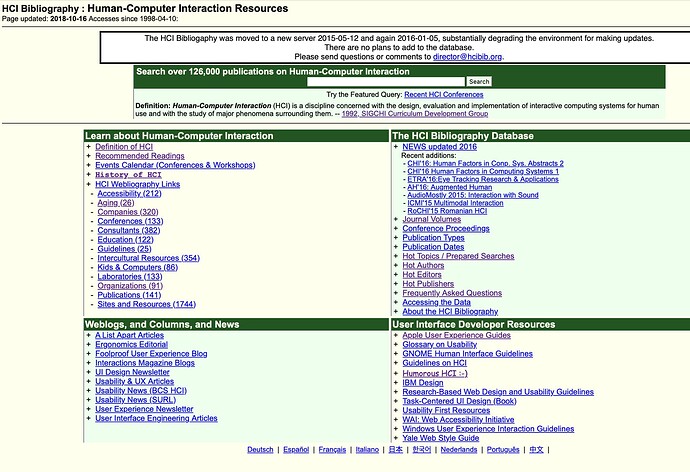Today I browsed hcibib.org, a bibliographic reference website for Human-Computer Interaction (HCI) resources. The website is hosted by ACM SIGCHI (Special Interest Group on Computer-Human Interaction) and provides academic resources in the field of human-computer interaction.
I want to start with the definition of HCI.
Human-Computer Interaction (HCI) is a discipline concerned with the design, evaluation, and implementation of interactive computing systems for human use, and with the study of major phenomena surrounding them. — 1992, SIGCHI Curriculum Development Group
But what exactly is it? People who lack experience might find this definition overly broad and vague.
First, I would suggest looking into the page that lists Hot Words/prepared searches. But please hold on.
Let’s try to recall all the research areas you think are related to HCI.
I’ve tried to list as many as I can think of from my understanding: HAI, AR/VR/MR, tangible interfaces, fabrication, education, children, aging, accessibility, usable security, usable privacy, healthcare, visualization, mobile computing, media, social computing, cognitive science…
I can also list venues, such as CHI, FAccT, IMWUT, SOUPS, CSCW, DIS, IDC, and IEEE VR.
Last time, I tried to get the hot words list. My sources included topics or tracks in conference workshops and calls for papers. You can check the popular research topics there. I also checked the selection dropdown in PCS.
Alright, back to the Hot Words/prepared searches page. I still found many terms outside of what I previously understood.
For example: “Authoritativeness,” “Persuasiveness,” “Credibility,” “Captology,” and “Situational Awareness.”
I suddenly feel that much of the work I previously saw has transformed into “Noun A + Noun B” projects.
